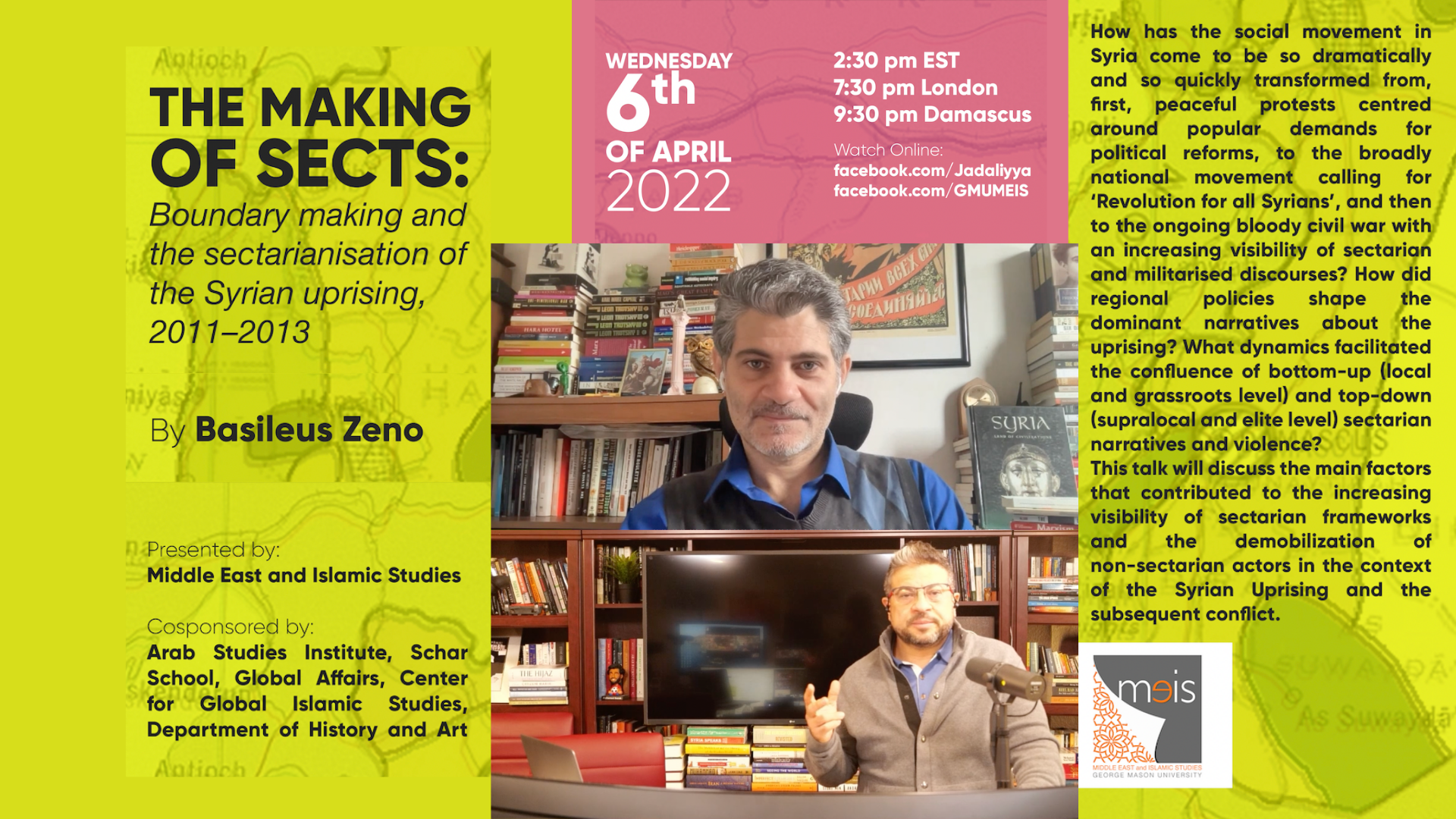GMU Middle East and Islamic Studies Presents
The Making of Sects:
Boundary Making and the Sectarianisation of the Syrian Uprising, 2011-2013
A conversation with Basileus Zeno moderated by Bassam Haddad
Cosponsored by: Arab Studies Institute, Schar School, Global Affairs, Center for Global Islamic Studies, Department of History and Art History
How has the social movement in Syria come to be so dramatically and so quickly transformed from, first, peaceful protests centred around popular demands for political reforms, to the broadly national movement calling for ‘Revolution for all Syrians’, and then to the ongoing bloody civil war with an increasing visibility of sectarian and militarised discourses? How did regional policies shape the dominant narratives about the uprising? What dynamics facilitated the confluence of bottom-up (local and grassroots level) and top-down (supralocal and elite level) sectarian narratives and violence?
This talk discusses the main factors that contributed to the increasing visibility of sectarian frameworks and the demobilization of non-sectarian actors in the context of the Syrian Uprising and the subsequent conflict.
Basileus Zeno is Karl Loewenstein Fellow and Visiting Lecturer in Political Science at Amherst College. He received his Ph.D. in Political Science from the University of Massachusetts Amherst in 2021. He also holds a Master's degree in Political Science from Ohio University, and a Master's degree in Classical and Islamic Archaeology from Damascus University. Basileus is firmly committed to public engagement and applied research. His writing has been published in academic as well as public-facing outlets, including Nations and Nationalism, Digest of Middle East Studies, the Middle East Law and Governance Journal, The Washington Post, Jadaliyya, and SyriaUntold. Basileus is a MESA Global Academy Fellow and part of the LSE research project “Legitimacy and citizenship in the Arab world,” and has served as a consultant at organizations such as the Carter Center’s Conflict Resolution Program and The United Nations Economic and Social Commission for Western Asia (UN-ESCWA). He is a co-editor of the Syria Page at Jadaliyya, and a co-founding member of Security in Context.
Bassam Haddad is Director of the Middle East and Islamic Studies Program and Associate Professor at the Schar School of Policy and Government at George Mason University. He is the author of Business Networks in Syria: The Political Economy of Authoritarian Resilience (Stanford University Press, 2011) and co-editor of A Critical Political Economy of the Middle East (Stanford University Press, 2021). Bassam is Co-Founder/Editor of Jadaliyya Ezine and Executive Director of the Arab Studies Institute. He serves as Founding Editor of the Arab Studies Journal and the Knowledge Production Project. He is co-producer/director of the award-winning documentary film, About Baghdad, and director of the acclaimed series Arabs and Terrorism. Bassam serves on the Board of the Arab Council for the Social Sciences and is Executive Producer of Status Audio Magazine and Director of the Middle East Studies Pedagogy Initiative (MESPI). He received MESA's Jere L. Bacharach Service Award in 2017 for his service to the profession. Currently, Bassam is working on his second Syria book titled Understanding the Syrian Tragedy: Regime, Opposition, Outsiders (forthcoming, Stanford University Press).



